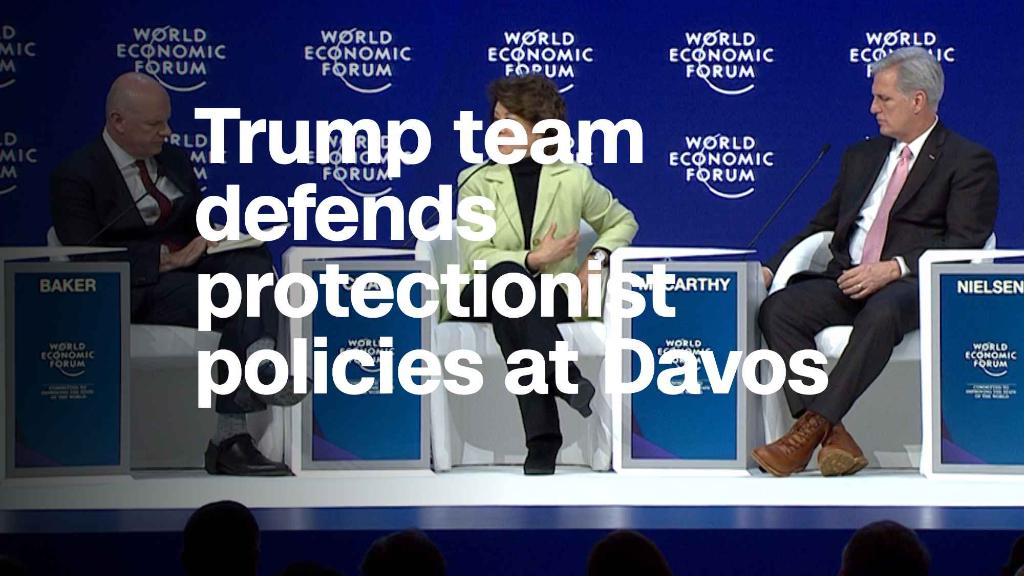
For years, U.S. companies have been betting big on China and laying down roots in the huge and fast-growing economy.
Now, as economic tensions between Washington and Beijing grow, some of America's best-known brands -- such as Apple (AAPL), Boeing (BA) and Intel (INTC) -- could get caught up in the middle of a trade war.
On Monday, the Trump administration announced tariffs on solar panels, an industry dominated by China. The Chinese government expressed "strong dissatisfaction" with the move.
With further trade actions looming, the relationship between the U.S. and China looks set to deteriorate. In the coming months, Trump must decide whether to penalize steel and aluminum imports. And on Wednesday, Commerce Secretary Wilbur Ross made clear that the White House intends to scale up its fight over intellectual property theft.
If the U.S. continues to escalate its trade actions against China, experts say retaliation is likely.
"They're going to fight back and fight back hard," said Scott Kennedy, an expert on the Chinese economy at the Center for Strategic and International Studies.
It's not clear which products or industries Beijing would target in a trade war -- but government leaders have plenty of options. Here are some of the American firms and industries at risk.
Boeing
Boeing could be first in China's line of fire. Civilian aircraft are the top U.S. export to China, according to Chinese customs data compiled by Panjiva, a global trade research firm.
Just because the U.S. made its most recent trade action about solar panels doesn't mean China will keep its focus there, Kennedy said.
"What if China decides that an effective way for it to respond would be for it to buy fewer Boeings and more Airbuses?" he said.
That's exactly what the Global Times, a state-run newspaper, proposed in an op-ed published in 2016. The article suggested that China is not afraid to take a "tit-for-tat" approach to trade, and that if China sees fit, "a batch of Boeing orders will be replaced by Airbus."
That would be a huge loss of business for Boeing, which in recent years has announced deals worth tens of billions of dollars to sell airplanes to China.
Soybean producers
Another key American export to China is soybeans.
The U.S. exported $22.5 billion in soybeans from December 2016 through November 2017, according to data from Panjiva. China was the largest customer, buying more than $13 billion worth.
If the Chinese decide to target U.S. soybeans, and begin to favor imports from other countries, it would deal a considerable blow to U.S. agriculture.
It's a big industry in the Midwest, particularly in Illinois, Iowa, Minnesota, North Dakota, Indiana and Missouri.
"In the aggregate, it would be a very, very large hit," said Nicholas Lardy, a fellow at the Peterson Institute for International Economics who focuses on the Chinese economy.
Apple
China is also a major market for Apple.
Roughly 7% of the company's sales are in mainland China, according to Factset data. That figure climbs to about 19% if Taiwan and Hong Kong are included.
"China has companies that compete directly head-to-head with Apple, so certainly it would be concerned about being caught in the crossfire [of a trade spat]," Kennedy said.
Chinese phone makers like Huawei, Oppo, Vivo and Xiaomi have been giving Apple a run for its money. Any effort by the Chinese government to curb iPhone sales could cause the company to lose momentum.
Qualcomm and Intel
China is the world's largest consumer of semiconductors, which are installed in the vast number of electronics products manufactured in the country.
A potential tariff on semiconductors would therefore be disastrous for Qualcomm (QCOM) and Intel (INTC), the American chipmaking giants.
Mainland China is the number one market for both companies, according to Factset data, and the firms have spent substantial time building up relationships there.
"Both Intel and Qualcomm, over the past few years, have really tried to buddy up to China," said Susquehanna International Group analyst Christopher Rolland, who tracks semiconductors.
Intel opened a $2.5 billion manufacturing facility in Dalian, China in 2010. In November, as part of President Trump's trip to China, Qualcomm announced $12 billion worth of deals with Chinese companies. Additional deals were unveiled Thursday.
Will China take the risk?
In the past, China has shown that it's willing to retaliate on trade.
When President Obama slapped a 35% tariff on Chinese tires in 2009, China imposed penalties on U.S. shipments of chicken parts and cars.
But putting tariffs on U.S. exports is a gamble. It could backfire on the Chinese economy by decreasing competition and threatening jobs.
"If they boycott Boeing then Airbus [has] a monopoly, and prices and [delivery] wait times go up hugely. If they boycott Apple then all the workers making those products in China lose their jobs," said Michael Every, head of financial markets research for the Asia-Pacific region at Rabobank Group, in an email.
Rolland said he doesn't think China will direct its ire at the semiconductor industry. Such a decision would raise the cost of manufacturing electronics, pushing business to places like Vietnam and the Philippines.
"If China did impose those tariffs, they would be shooting themselves in the foot," Rolland said. "They would be making themselves, from a manufacturing standpoint, uncompetitive."


